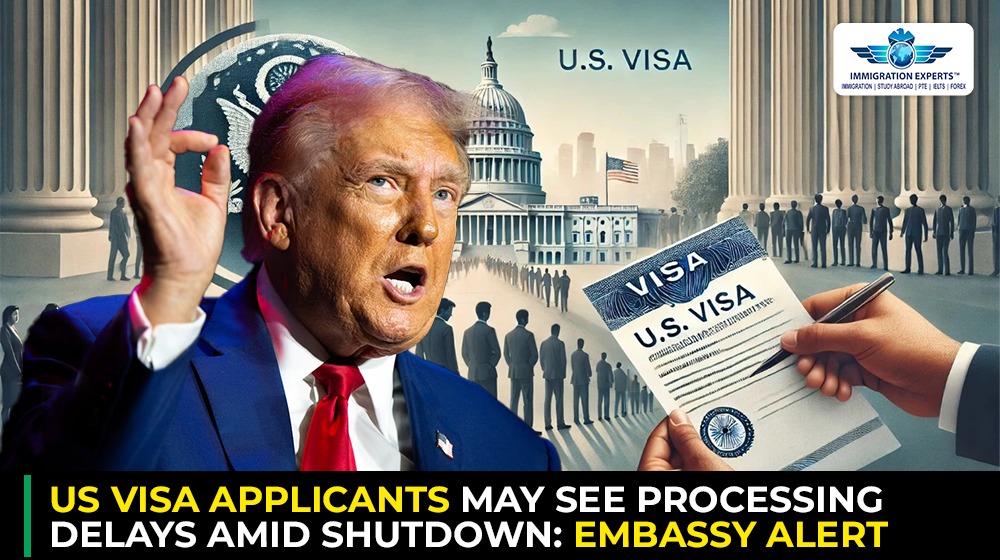
US Visa Applicants May See Processing Delays Amid Shutdown: Embassy Alert
The United States government has entered its first shutdown in seven years, triggering immediate concerns across multiple sectors. While many federal agencies are scaling back operations due to the budget deadlock in Congress, questions are rising about how this situation might impact visa applicants in India and around the world.
The US Embassy in India has issued an official alert, clarifying that visa and passport services will continue for now. However, applicants are advised to prepare for potential delays because the ripple effects of the shutdown could indirectly affect several aspects of the immigration system.
Embassy Confirms Continuity of Visa and Passport Services
Despite the shutdown, the embassy assured applicants that scheduled passport and visa services will remain operational. These include categories such as tourist visas, business visas, student visas, and H-1B work visas.
A statement from the embassy, posted on X (formerly Twitter), noted:
"At this time, scheduled passport and visa services in the United States and at US Embassies and Consulates overseas will continue during the lapse in appropriations as the situation permits. We will not update this account until full operations resume, with the exception of urgent safety and security information."
This update provides reassurance to thousands of Indian applicants who are currently waiting for appointments or processing decisions. However, it also signals that applicants should be ready for possible slowdowns in the coming weeks.
What Happens in a US Government Shutdown?
A shutdown takes place when lawmakers in the US Congress fail to agree on a budget or appropriations bill. Without this funding, federal agencies cannot fully operate, and many services are suspended.
- Non-essential services paused: Staff in non-critical roles are placed on temporary leave without pay.
- Essential roles continue: Certain federal employees, such as those in safety, security, and property protection, must continue working. However, they do so without pay until a budget deal is reached.
This disruption has broad effects across sectors. From national parks to research projects, many areas of public life feel the impact until operations resume. Immigration, while partially insulated, is not entirely immune to these challenges.
Why Visa Services May Still Face Delays
Visa services often continue during a shutdown because they are funded through filing fees. Applicants pay visa and immigration processing fees, which are earmarked to sustain operations at embassies and consulates. This makes these services less dependent on annual congressional appropriations.
However, experts point out that indirect delays are possible. Adesh Nandal, Advocate at Jotwani Associates, explained to Business Standard:
"The visa processing system is somewhat insulated from disruptions, as USCIS and the Department of State’s consular services are largely fee-funded. However, ripple effects cannot be ruled out. Agencies that support visa processes, such as the Department of Labor or the FBI, may face funding challenges, which could result in slower certifications or background checks."
This means that while embassies remain open, certain visa categories—particularly those requiring labor certifications or security clearances—may face extended processing times.
Impact on H-1B, Student, and Tourist Visa Applicants
Different visa categories could see different levels of impact:- H-1B visas: Processing requires a Labor Condition Application (LCA) certification from the Department of Labor. A shutdown could slow down these approvals, creating backlogs for skilled professionals awaiting work in the US.
- Student visas (F-1, J-1): While basic visa processing may continue, background verification or linked approvals may face bottlenecks.
- Tourist visas (B1/B2): These may experience fewer direct impacts, but overall wait times could still increase due to system-wide slowdowns.
Applicants in India are particularly attentive because the country is one of the largest sources of H-1B and student visa applicants worldwide.
Broader Implications for Travelers and Businesses
The uncertainty created by the shutdown has far-reaching consequences. International students preparing for admissions, companies depending on skilled workers, and families waiting for visitor visas could all face stress if processing times are extended.
For businesses in both the US and India, any delay in workforce mobility affects project timelines, hiring plans, and long-term investments. Similarly, students who rely on strict academic timelines may find themselves anxious about missing deadlines for travel or enrollment.
How Applicants Can Prepare
The embassy has not announced any cancellations of services, but applicants should remain proactive:- Keep track of embassy updates: Official channels such as the US Embassy’s website and social media accounts are the most reliable sources of information.
- Plan for delays: Build extra time into travel or work schedules to account for potential slowdowns in approvals.
- Consult immigration experts: Legal and immigration advisors can help applicants understand how a shutdown may affect their specific case type.
- Complete applications carefully: Errors or missing documents could cause additional delays during a period when processing may already be slower than usual.
Shutdown History and the Road Ahead
This shutdown marks the first in seven years, though the US has experienced more than 20 shutdowns since the 1970s. The longest shutdown lasted 35 days between December 2018 and January 2019, causing significant disruptions across the country.
Whether this current shutdown will be short-lived or prolonged depends on how quickly lawmakers in Congress can reach an agreement on government spending. Until then, uncertainty will remain for millions of people who depend on federal services, including international travelers and visa applicants.
Conclusion:
While the US Embassy in India has confirmed that visa and passport services will continue despite the government shutdown, applicants should remain alert. The possibility of indirect delays due to slowed operations in supporting agencies cannot be dismissed.
For now, applicants are advised to monitor official embassy updates, stay prepared for longer processing times, and consult professionals if necessary. The coming weeks will determine how deeply this shutdown affects visa operations, but the alert underscores the importance of patience and planning for all those awaiting their US travel and immigration approvals.
Stay Updated on US Visa News
Don’t miss important updates on US visa rules, processing timelines, and embassy alerts. Subscribe to our immigration newsletter and get the latest news delivered straight to your inbox.
- Email: info@immigrationxperts.com
- Call us: +91-9999467686, +91-8447-696555





